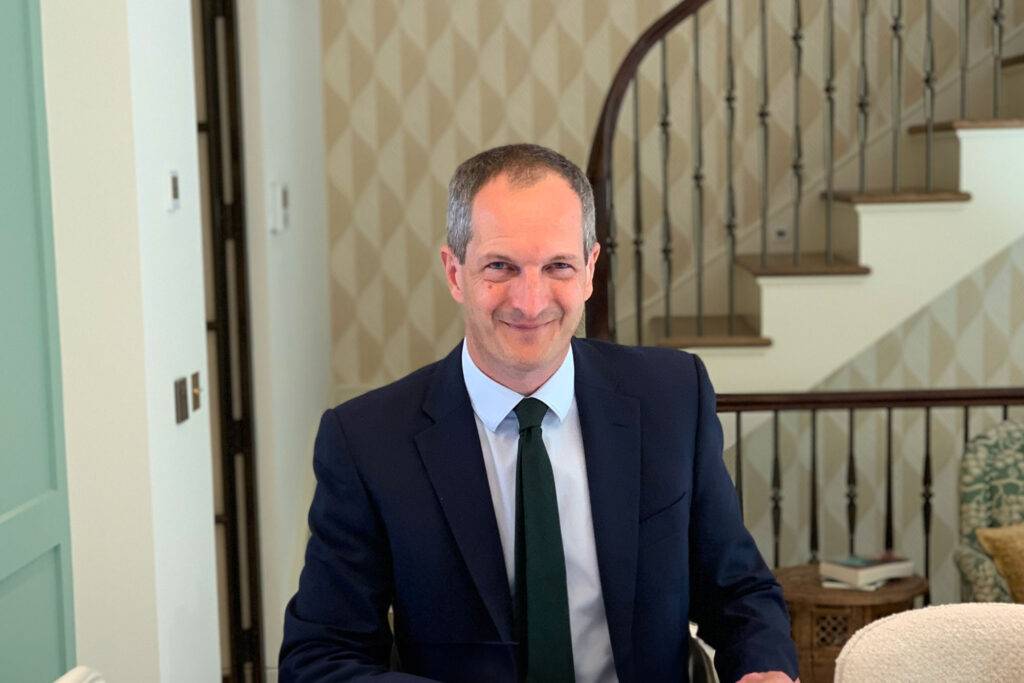Lord Bethell ran a public affairs firm, was a Minister during Covid, and is now a member of the House of Lords. It was a pleasure to hear his thoughts on getting policy unstuck, from how evidence and campaigning dovetail, to the importance of making the connection between policy and politics, and the challenges of being a politician.
My mission is to help Britain to be healthier. And the way we can do that most effectively is to look at the determinants of health. The greatest areas of opportunity are to address the really nasty things that are making us ill: mouldy homes, internet filth, junk food, toxic workplaces, the pollution element of our lives.
Working particularly in the Department of Health, which is a very impressive Department – full of very bright people, lots of doctorates, literally doctors – forced me to be grounded in the principles of evidence-based policy making.
You have to grind out the evidence base and the arguments and tick off the often quite legitimate concerns that some may have. It’s easy when you’re on the outside to think that decisions are being made in a sort of piecemeal way… they are worked out with very detailed analysis of whatever evidence exists. Seeing it from the inside made me have a much greater appreciation for that part of the process.
Effective campaigning can make a really big difference. There are loads of things that should happen but don’t because no one’s bothered to bring together the stakeholders and articulate the arguments in clear, understandable terms, and to kill off distracting rubbish and nonsense. It’s given me a greater appreciation for the skills and craft of political communication.
Get policy insights into your inbox
NewsletterMaking the connection between evidence-based policymaking and retail politics is very difficult. It is both a science and an art. Trying to bridge that creative gap is something that think tanks really struggle to do. They spend too much time talking to the producer interest, talking to the professionals, the industry bodies and stakeholder groups, and not enough time trying to create propositions that can be sold into the public. It’s not just think tanks – the Frameworks Institute material that has been developed in the health space is a terrific way of talking to stakeholders and explaining to people about the determinants of health. It is of no value whatsoever to politicians.
Quite a lot of politicians are policy hobbyists. There are some politicians who only do politics, who would never read a submission. But most of the good ones are very much into the policy, though some can be too much in the policy. If you read Rory Stewart’s book, he’s basically a policy professional. Then you have policy nihilist types like Boris Johnson who only does politics really, and has a sort of butterfly approach to policy. Then there are those like Michael Gove, Tom Tugendhat, and Alicia Kearns, people who absolutely own their policy space and have hammered out really strong views but also know how to do the politics. They are the most effective I think.
There are some really big problems in Government. I think the Cabinet Office is a particularly big problem. The dysfunction at the centre of government means that the different bits of government can’t work together. Some ministers really struggle to get the Civil Service to work for them. During the pandemic I did not find that – even though we started off the pace, the Department of Health and the NHS absolutely stepped up to the challenge massively. Ministers who blame the Civil Service for their failure to get things done make me wonder how good they were at driving the machine. The craft of being a minister is understanding what you need to do in order to get the system to work for you.
It’s partly a family tradition. I’m the fifth Lord Bethell, we’ve been doing this for a century. I think of politics as akin to being a professional plumber sorting out the world’s broken sewage problems: it’s not that much fun when you’re in it and the work is not glorious, but it’s satisfying to see the results. I definitely had more fun running my own business. You’re much more in control of your own destiny, the people are engaging, and the craft of political communication is rewarding. It’s a fascinating job, whereas politics is intrinsically frustrating. But the sense of working on the big stage tackling the big issues is very rewarding.
Parting thoughts…
I haven’t always stayed sane. There have been moments when I’ve really struggled to get through the day. I have regimes… drinking alcohol is a bad idea, it’s very depressing, and so I avoid it. I do cold water swimming which is a really nice reboot two, three, or four times a week which keeps me physically and mentally fit. I do find politics can be brutal, quite lonely and challenging – it’s worth investing in your physical and mental health.
Sign up to our newsletter to get insights from other policy thinkers and campaigners like Lord Bethell into your inbox.





